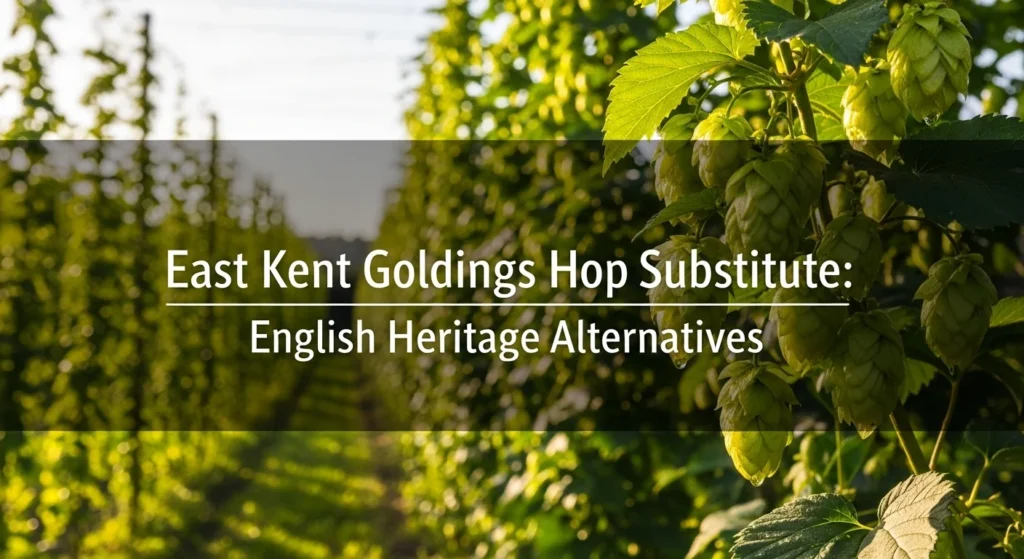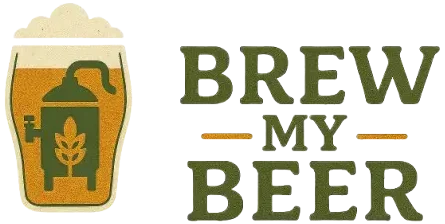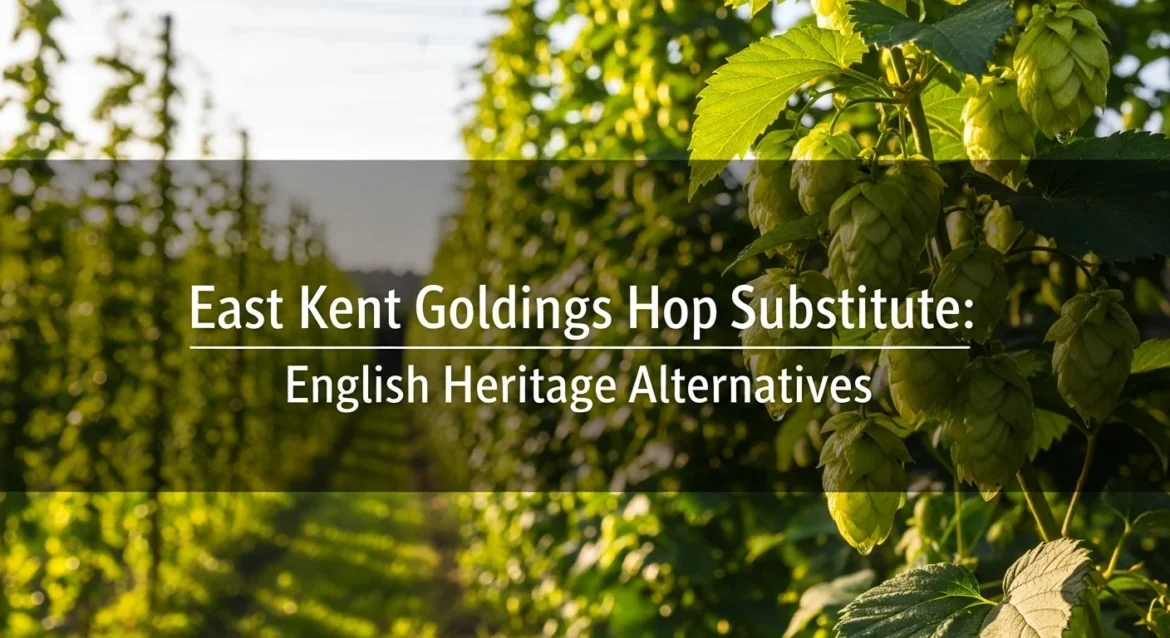Discover the best East Kent Goldings hop substitutes for authentic English ale character – find 7 alternatives that deliver floral, honey-like flavor in 2025.

Planning a traditional English bitter around East Kent Goldings only to discover they’re completely sold out? I’ve faced this frustration more times than I care to admit over my years brewing authentic British-style ales. This legendary English variety’s distinctive floral-honey character seems irreplaceable until you understand which alternatives actually deliver similar results when using home brewing equipment.
Finding the right East Kent Goldings hop substitute matters because this heritage landrace hop brings exceptional English character – delicate floral notes, honey-like sweetness, and subtle marmalade undertones – with moderate alpha acids (4-6.5%) perfect for traditional cask ales and ESBs.
I’ve tested every suggested East Kent Goldings alternative across bitters, pale ales, and porters to understand how different hops perform when you’re chasing that elusive combination of refined English elegance with approachable traditional character. Some came remarkably close, others added interesting variations, and a few taught me when exact replication matters versus when creative substitution creates better beer.
This guide breaks down seven proven substitutes based on real brewing experience, complete with hop pairing strategies, usage recommendations, and style-specific guidance so you’re never stuck scrambling on brew day.
Understanding East Kent Goldings Hop Character
East Kent Goldings delivers refined English aromatics with dominant notes of floral honey, lavender, and subtle marmalade that make it one of England’s most revered traditional hop varieties. This landrace hop dates back centuries in Kent’s fertile hop gardens, representing authentic English brewing heritage.
The alpha acid content ranges from 4.0-6.5%, positioning East Kent Goldings as an aroma-focused noble-type hop best suited for flavor and aroma applications. According to Northern Brewer, EKG provides smooth, delicate, fragrant, and slightly sweet flavors with floral, lavender, honey, earthy, lemon zest, and thyme notes.
What I love about East Kent Goldings is its refined complexity without aggressive hop presence. You get clean floral elegance with honey-like sweetness and subtle citrus that work beautifully in English bitters, ESBs, and porters where hop character should complement rather than dominate traditional British malt profiles.
The flavor profile combines gentle florals with earthy depth. According to Good Beer Hunting’s analysis, Goldings and Fuggles changed modern beer forever despite their genetic closeness presenting very different characteristics due to different growing terroir.
When formulating an East Kent Goldings hop substitute strategy, I focus on three elements: the floral-honey base, gentle earthy undertones, and clean finishing character that creates refined English complexity without harsh bitterness.
Direct Single-Hop Replacements
Fuggle: The Related English Classic
Fuggle provides the most commonly suggested substitution being genetically related to Goldings at 4-5.5% alpha acids. This classic English variety shares heritage making it a natural alternative, though it brings more pronounced earthy-woody character versus EKG’s refined florals.
The key difference is Fuggle’s earthier profile versus East Kent Goldings’ delicate floral honey. According to homebrewing forums, Fuggle is earthy with herbiness while EKG is herbs with lemongrass – definitely not the same.
Usage adjustment: Direct 1:1 substitution for most applications
Best applications: English bitters, milds, porters, brown ales
Styrian Goldings: Fuggle-Derived Alternative
Styrian Goldings delivers earthy-spicy character at 4.0-6.0% alpha acids being Fuggle grown in Slovenia. According to American Homebrewers Association forums, Styrian Goldings is Fuggle-derived with more earthy flavors versus EKG’s lighter floral category.
I’ve found Styrian particularly effective in English-style ales where you want traditional hop character. According to Brew Your Own Magazine, Styrian Goldings typically substitutes for Fuggles but works for EKG in pinch.
Substitution ratio: 1:1 for most applications
Ideal styles: English bitter, porter, ESB
Willamette: American Fuggle Heritage
Willamette brings mild spice with floral-earthy aromatics at 4-6% alpha acids. This American triploid bred from Fuggle genetics offers similar noble characteristics to EKG while adding American-grown consistency.
Reddit brewing communities report that Willamette substitutes effectively for both Fuggle and East Kent Goldings in traditional English recipes.
Flavor profile: Spicy, floral, earthy, subtle fruit
Best usage: Late additions, dry hopping in ales
English Hop Family Alternatives
First Gold: Modern English Dwarf
First Gold delivers traditional English character at 6.5-8.5% alpha acids being a dwarf variety bred from Goldings parentage. According to Brew Your Own, First Gold is a good substitute for Kent Goldings in English ales.
Usage notes: Reduce quantities 15-20% due to higher alpha acids
Applications: English pale ale, bitter, best bitter
Challenger: English Workhorse
Challenger brings balanced English character at 6.5-9% alpha acids with earthy, spicy, and fruity notes. While more assertive than EKG, Challenger works well when you want noticeable English hop presence.
Substitution ratio: Reduce by 20-25% due to higher AA
Best styles: ESB, English IPA, porter
Target: Fuggle Descendant
Target offers Fuggle-like earthy character at 9.5-12.5% alpha acids making it suitable for bittering while maintaining English hop heritage. Use primarily for early additions with EKG-like hops finishing.
Flavor profile: Earthy, herbal, spicy, sage, English character
Usage: Bittering additions, blend with EKG-style hops
Strategic Hop Combination Blends
The English Duo: Fuggle + Styrian Goldings
Combining 60% Fuggle with 40% Styrian Goldings creates a substitute capturing East Kent Goldings’ earthy base while adding complex spice. This duo works brilliantly in English bitters and ESBs where traditional hop layers define the style.
The Fuggle provides earthy English backbone while Styrian contributes subtle spice complexity. Together they approximate EKG’s profile while maintaining authentic British character.
Usage rates:
- Late additions: 1-1.5 oz total per 5 gallons
- Dry hop: 0.5-1 oz total per 5 gallons
The Heritage Blend: Fuggle + Willamette
For American interpretations of English styles, try 50% Fuggle and 50% Willamette. This combination provides traditional earthy character with reliable American-grown availability and consistency.
| Hop Combination | Ratio | Flavor Focus | Best Beer Styles |
|---|---|---|---|
| Fuggle + Styrian Goldings | 3:2 | Earthy-spice balance | Bitter, ESB |
| Fuggle + Willamette | 1:1 | Traditional accessible | English pale, porter |
| Fuggle + First Gold | 2:1 | Modern English | Best bitter, IPA |
| Styrian + Willamette | 1:1 | Clean earthy | Brown ale, mild |
Style-Specific Substitution Strategies
English Bitters and Best Bitters
Fuggle or Styrian Goldings work best for bitters where you want traditional English hop character supporting malty sweetness. Use 0.75-1.5 oz per 5 gallons across late additions for optimal noble English expression.
For best bitters specifically, consider blending Fuggle with 25% First Gold to add contemporary English character while maintaining approachable traditional profiles that define the style.
ESB and Strong Bitters
First Gold or Challenger excel in ESBs where you want robust but refined English hop presence. Target 25-40 IBUs with balanced hopping throughout boil for characteristic ESB complexity.
These substitutes provide the traditional British character ESB demands while supporting rich malty sweetness from crystal malts through balanced bittering and refined aroma.
Porters and English Browns
Fuggle delivers classic character in dark English ales where earthy hop complements roasted and chocolate malts. I use Fuggle at 0.5-1.0 oz per 5 gallons for balanced porter profiles.
The gentle earthiness works particularly well with brown malt character creating authentic English brown ale and porter that honors traditional brewing methods.
English Pale Ales
Willamette or blend of Fuggle and First Gold creates excellent English pale ales. Keep hopping rates moderate – 1.0-2.0 oz per 5 gallons – for approachable character that defines sessionable British pale ales.
Brewing Process Optimization
Late Addition Techniques
Late hop additions (15 minutes and under) require closer flavor matching than bittering additions where extended boiling drives off aromatic compounds. This is where Fuggle and Styrian truly excel as EKG substitutes.
For optimal aroma extraction:
- Add at flameout and steep 15-20 minutes
- Maintain temperatures 170-180°F
- Use slightly higher quantities (1.1x) for less aromatic varieties
Dry Hopping Considerations
East Kent Goldings works beautifully for dry hopping English ales. When substituting, Fuggle or Styrian Goldings perform exceptionally well, providing subtle complexity without aggressive hop punch.
Keep contact times moderate (4-6 days) to extract floral-earthy character. The key is understanding these hops contribute refined complexity rather than bold aroma – you’re building traditional English layers.
Cask Conditioning Applications
Traditional cask ales benefit most from authentic EKG character. When substituting, Fuggle maintains closest traditional profile for hand-pulled bitters and milds where subtle hop supports beer’s natural carbonation and cellar temperature serving.
Seasonal Availability and Sourcing
Understanding English Hop Harvest
English hops harvest late August through September with peak availability October-December when freshness is optimal. Smart brewers stock up during this window when traditional English varieties are widest available.
East Kent Goldings and substitutes maintain reasonable year-round availability compared to trendy varieties. I keep vacuum-sealed 1-pound bags as insurance against recipe changes.
Import vs. Domestic Considerations
English-grown East Kent Goldings from traditional Kent regions often provide superior aromatics compared to alternatives, though availability challenges require strategic planning during peak seasons.
American-grown Willamette and Fuggle offer excellent consistency at lower prices. For most homebrewers, domestic versions perform comparably while ensuring reliable availability.
Quality Control and Storage
Proper Hop Storage Methods
Vacuum sealing and freezing maintains English hop quality for 18-24 months when stored at 0°F or below. Noble-type hop varieties show aromatic degradation over time, making proper storage critical.
Label packages clearly with variety, alpha acid percentage, crop year, and purchase date. English hop chemistry degrades noticeably requiring careful rotation and stock management.
Evaluating Hop Freshness
Fresh English hops smell delicate and herbal-floral when rubbed between fingers. Oxidized hops develop cheese or cardboard aromas signaling degraded lupulin unsuitable for aromatic brewing applications.
Check packages regularly for air infiltration. Vacuum-sealed bags showing air pockets should be used quickly or resealed to prevent continued aromatics degradation.
Frequently Asked Questions
What’s the closest substitute for East Kent Goldings?
Fuggle provides the most similar English character being genetically related with comparable alpha acids and traditional British hop profile. Styrian Goldings offers next-closest match with Fuggle-derived earthy character.
Can I use Cascade instead of East Kent Goldings?
Cascade changes beer character significantly with prominent American citrus notes versus EKG’s delicate floral-honey profile. Not recommended for authentic English styles requiring traditional noble hop character.
How do I substitute EKG in bitter?
Use Fuggle or Styrian Goldings focusing on late additions and potentially dry hopping. Target 0.75-1.25 oz per 5 gallons to provide English hop character without overwhelming malt-forward bitter profiles.
Are English hops better than American substitutes?
Quality depends on freshness and storage rather than geography alone. Fresh American-grown Willamette or Fuggle often outperforms older English imports due to reduced shipping time and better supply chain storage.
What alpha acid should I target?
Target 4-6.5% alpha acids when selecting East Kent Goldings substitutes for direct replacement. This range matches typical EKG profiles and requires minimal recipe reformulation.
Can I use multiple substitutes together?
Absolutely – blending often produces superior results compared to single hop substitutions. The Fuggle + Styrian Goldings combination consistently receives praise from traditional English-style brewers.
Do substitutes work in Belgian beers?
Yes – Styrian Goldings works excellently in Belgian ales where earthy-spicy hop character supports Belgian yeast phenolics without creating flavor conflicts or excessive hop-derived bitterness.
Making Your Final Selection
Choosing the right East Kent Goldings hop substitute depends on understanding your beer style requirements and traditional character goals. Fuggle offers closest English heritage with minimal adjustment while Styrian adds complex earthy spice.
Don’t hesitate to experiment with combinations – my best ESB uses 60/40 Fuggle/Styrian creating complexity that arguably honors EKG’s traditional character. Detailed brewing notes help identify successes worth repeating.
Remember that hop substitution involves both science and brewing tradition. We can match alpha acids and flavor descriptors, but achieving authentic English character depends on terroir, freshness, and brewing process only you control.
View missing ingredients as opportunities to explore English brewing heritage. Stock multiple traditional alternatives so you’re always prepared, and taste critically to understand how different English hops affect your finished British-style ales.
Start with these proven substitutions, adjust based on results, then refine your personal approach to traditional English hop character. That hands-on experience becomes invaluable knowledge supporting years of authentic British brewing.
About the Author
Dave Hopson is a certified Cicerone® and beer historian who has visited over 200 breweries across 15 countries, with particular expertise in English brewing traditions and heritage hop varieties. With a background in anthropology and culinary arts, Dave brings unique perspectives to understanding regional hop varieties and their cultural significance in traditional British brewing. He specializes in documenting how English hop lineages like East Kent Goldings have shaped modern brewing while maintaining authentic character across centuries. His research on Kent hop cultivation and traditional cask ale production has been featured in several brewing publications.
When not conducting comparative tastings of English hop varieties or exploring historic Kent hop gardens, Dave enjoys hosting his popular podcast “Hop Tales,” where he interviews traditional cask ale brewers about their ingredient sourcing philosophies and commitment to English brewing heritage. Connect with him at [email protected] for more insights on English beer culture and traditional hop selection.

